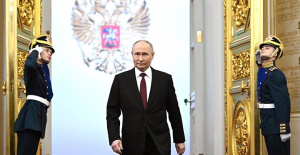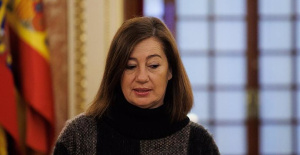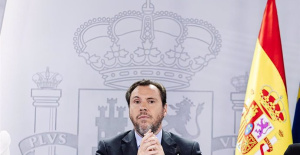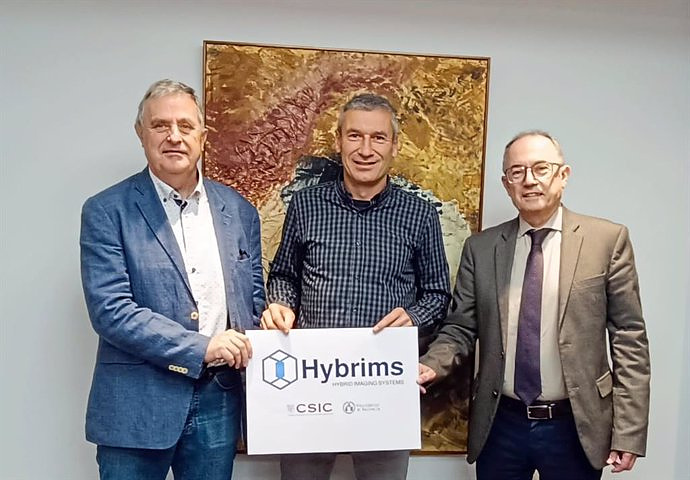They believe that the TC's decision "exceeds the limits of constitutional justice" and makes it an arbitrator of legislative processes
MADRID, 28 Dic. (EUROPA PRESS) -
The joint particular vote of the progressive magistrates of the Constitutional Court (TC) Cándido Conde-Pumpido, Ramón Sáez Valcárcel and Inmaculada Montalbán points out that the decision to suppress certain amendments by which it was sought to modify the system of election of the candidates to the court that appoints the General Council of the Judiciary (CGPJ) "is unusual in the history of the Constitutional Court" because "it constitutes an unprecedented interference in the legislative function."
In their letter, collected by Europa Press, they add that this interference was also carried out "without even allowing the contradictory hearing required by any process", and they regret that the deliberation and resolution of this matter has generated a division into two blocks of the members of the plenary session of the TC that "transfers to public opinion an image of mimicry or following of the parliamentary confrontation and the partisan political conflict".
In addition, they point out that the disagreement with the decision of the Plenary -- it went ahead by 6 votes against 5 -- "is of root and initial", and they assert that the challenged magistrates --Pedro González-Trevijano and Antonio Narvaez-- "should not have form part of the college that would rule on the claims of the plaintiffs (...) and the defendants".
Throughout 21 pages, the magistrates refute the decision of the guarantee court that was known on December 19 and that estimated the very precautionary measures that the PP claimed in its appeal for amparo. They place special emphasis on the challenges and assert that they find no sense in accepting the representation of the deputies who promoted the legislative initiative "to then deny them legitimacy to defend their fundamental right to an impartial judge, expressly rejecting the challenge they presented" .
In line, they point out that the circumstance occurs that the two judges concerned participated in the resolution by which the TC rejected the challenge, both González-Trevijano and Narvaez. They consider that in a matter in which the court judges the reform of its own law and the possibility of renewal of its personal composition, "the requirements of appearance of impartiality should be more demanding."
In addition, they explain that the challenges should have been the first thing to be discussed in the process because, in accordance with the principle of impartiality, the suspension of the development of the main cause in which the complaint has been filed is imposed until the incident is decided. recusal.
And they add that the challenged should not have intervened in the decision on the admission of their own challenge because they become "judge and party" and generate doubts about impartiality in society. "Whoever has been challenged does not intervene in the deliberation and decision on the admission of the challenge, with the sole exception that the quorum necessary to decide is affected," they add.
On the other hand, they do not share the reasons why both challenges were rejected because they understand that "the appearance and the challenge have been requested simultaneously" therefore the Plenary's argument that the applicants lacked standing to request the challenge since they were not constituted the procedural legal relationship at that time is not sustained.
"Nothing justifies rejecting the study of the second once it is recognized that they have a legitimate interest to appear in the case", they insist, adding that "this produces a kind of procedural illusion in which the legitimacy of the challengers is recognized in one line and denied on the next".
Regarding the appeal of the PP requesting the very precautionary measure to suspend the processing, the magistrates indicate that this claim for precautionary protection "radically shifts the object of control" of the TC that allows the appeal for amparo.
And they add that the suspension of the legislative procedure in the upper house and the stoppage of the processing and approval of the amendments, "lacks legal provision so that it can be agreed in an amparo process."
In addition, they emphasize that this precautionary measure "anticipates the result of the amparo appeal and is not provisional but irreversible, since it causes the definitive disappearance of the amendments to the text that will end in an organic law, depriving the process of purpose."
They point out that the order of the TC contradicts interpretative precedents since "the procedure of formation of the legislative will before it had been definitively configured" has never been controlled by means of amparo.
Thus, they understand that "the limits of constitutional justice are overflowing" that operates in the Spanish model through a successive control of the validity of the law, after its approval. "It turns the Court into an arbiter of legislative processes, distorting the foundations of parliamentary democracy," they lament.
In this sense, they point out that the fact that the admissibility of the PP's appeal has been examined with "astonishing speed" has caused the "anomalous situation" that the TC has ruled during the processing of the legislative procedure.
"The order ignores --thus-- the constitutional doctrine according to which it is the Chambers themselves that are responsible for ensuring, throughout the parliamentary procedure (and, therefore, until its completion), so that their acts and resolutions are in accordance with the Constitution", they indicate.
In addition, regarding the precautionary measure of unheard-of suspension --without listening to the parties-- they indicate that "it is inadequate" because it makes the amparo lose its ultimate purpose because it anticipates "definitively the estimatory pronouncement on the merits of the appeal."
They stress that, however, "the most serious thing is that with its adoption the fundamental principles of parliamentary democracy have been altered, as well as the design of the constitutionality control system, throwing a political burden on the court that is difficult to bear."
In short, they maintain that the stoppage was "inappropriate" and that it cannot be ignored that the suspension affected "the rights of the deputies" who already voted for the amendment in the plenary session of Congress in exercise of their right to exercise their representative function.
For her part, magistrate María Luisa Balaguer signs a dissenting opinion defending that the PP's appeal should have been inadmissible due to "inadequacy of the procedure for the purpose of the claims" of the 'popular'. She maintains that since the parliamentary procedure that allows the revision of amendments was still open when the appeal was presented, she supposes an "irremediable obstacle to admissibility" of the same.
It also indicates that, once the appeal was admitted, a separate case should have been opened to study the challenges raised and the precautionary measures should have been dismissed.
In line, he recalls that "the TC can only control the law once it has been published in the Official State Gazette" and regrets that the consensus that existed on this point "is broken with the order" of the disagree.
In his opinion, what the majority of the Plenary does when admitting the appeal for processing is "acting as 'de facto' legislator." "The TC prevents, in this way, that the Parliament finishes conforming its will, thus assuming a competence that it lacks and, what is more serious, preventing the legislative body from carrying out its own", he points out.

 Exploring Cardano: Inner Workings and Advantages of this Cryptocurrency
Exploring Cardano: Inner Workings and Advantages of this Cryptocurrency Seville.- Economy.- Innova.- STSA inaugurates its new painting and sealing hangar in San Pablo, for 18 million
Seville.- Economy.- Innova.- STSA inaugurates its new painting and sealing hangar in San Pablo, for 18 million Innova.- More than 300 volunteers join the Andalucía Compromiso Digital network in one month to facilitate access to ICT
Innova.- More than 300 volunteers join the Andalucía Compromiso Digital network in one month to facilitate access to ICT Innova.-AMP.- Ayesa acquires 51% of Sadiel, which will create new technological engineering products and expand markets
Innova.-AMP.- Ayesa acquires 51% of Sadiel, which will create new technological engineering products and expand markets Putin begins his fifth term demanding the "security" and "unity" of Russia
Putin begins his fifth term demanding the "security" and "unity" of Russia Almeida points to the death of two workers after being trapped under an 8-ton slab in Madrid
Almeida points to the death of two workers after being trapped under an 8-ton slab in Madrid Armengol and two former senior officials from the Balearic Islands, summoned by the Congressional commission on masks
Armengol and two former senior officials from the Balearic Islands, summoned by the Congressional commission on masks Puente assures that if he had known the impact of his words on Milei he would not have said them
Puente assures that if he had known the impact of his words on Milei he would not have said them How Blockchain in being used to shape the future
How Blockchain in being used to shape the future Not just BTC and ETH: Here Are Some More Interesting Coins Worth Focusing on
Not just BTC and ETH: Here Are Some More Interesting Coins Worth Focusing on They develop devices for the precise diagnosis of cancer patients
They develop devices for the precise diagnosis of cancer patients UMH researchers are working on a high-quality apricot crop that requires less irrigation water
UMH researchers are working on a high-quality apricot crop that requires less irrigation water The UPV develops an application to improve the quality of life of patients with glioblastoma
The UPV develops an application to improve the quality of life of patients with glioblastoma A sensor system obtains the fingerprint of essential oils and detects if they have been adulterated
A sensor system obtains the fingerprint of essential oils and detects if they have been adulterated A million people demonstrate in France against Macron's pension reform
A million people demonstrate in France against Macron's pension reform Russia launches several missiles against "critical infrastructure" in the city of Zaporizhia
Russia launches several missiles against "critical infrastructure" in the city of Zaporizhia A "procession" remembers the dead of the Calabria shipwreck as bodies continue to wash up on the shore
A "procession" remembers the dead of the Calabria shipwreck as bodies continue to wash up on the shore Prison sentences handed down for three prominent Hong Kong pro-democracy activists
Prison sentences handed down for three prominent Hong Kong pro-democracy activists ETH continues to leave trading platforms, Ethereum balance on exchanges lowest in 3 years
ETH continues to leave trading platforms, Ethereum balance on exchanges lowest in 3 years Investors invest $450 million in Consensys, Ethereum incubator now valued at $7 billion
Investors invest $450 million in Consensys, Ethereum incubator now valued at $7 billion Alchemy Integrates Ethereum L2 Product Starknet to Enhance Web3 Scalability at a Price 100x Lower Than L1 Fees
Alchemy Integrates Ethereum L2 Product Starknet to Enhance Web3 Scalability at a Price 100x Lower Than L1 Fees Mining Report: Bitcoin's Electricity Consumption Declines by 25% in Q1 2022
Mining Report: Bitcoin's Electricity Consumption Declines by 25% in Q1 2022 Oil-to-Bitcoin Mining Firm Crusoe Energy Systems Raised $505 Million
Oil-to-Bitcoin Mining Firm Crusoe Energy Systems Raised $505 Million Microbt reveals the latest Bitcoin mining rigs -- Machines produce up to 126 TH/s with custom 5nm chip design
Microbt reveals the latest Bitcoin mining rigs -- Machines produce up to 126 TH/s with custom 5nm chip design Bitcoin's Mining Difficulty Hits a Lifetime High, With More Than 90% of BTC Supply Issued
Bitcoin's Mining Difficulty Hits a Lifetime High, With More Than 90% of BTC Supply Issued The Biggest Movers are Near, EOS, and RUNE during Friday's Selloff
The Biggest Movers are Near, EOS, and RUNE during Friday's Selloff Global Markets Spooked by a Hawkish Fed and Covid, Stocks and Crypto Gain After Musk Buys Twitter
Global Markets Spooked by a Hawkish Fed and Covid, Stocks and Crypto Gain After Musk Buys Twitter Bitso to offset carbon emissions from the Trading Platform's ERC20, ETH, and BTC Transactions
Bitso to offset carbon emissions from the Trading Platform's ERC20, ETH, and BTC Transactions Draftkings Announces 2022 College Hoops NFT Selection for March Madness
Draftkings Announces 2022 College Hoops NFT Selection for March Madness
























